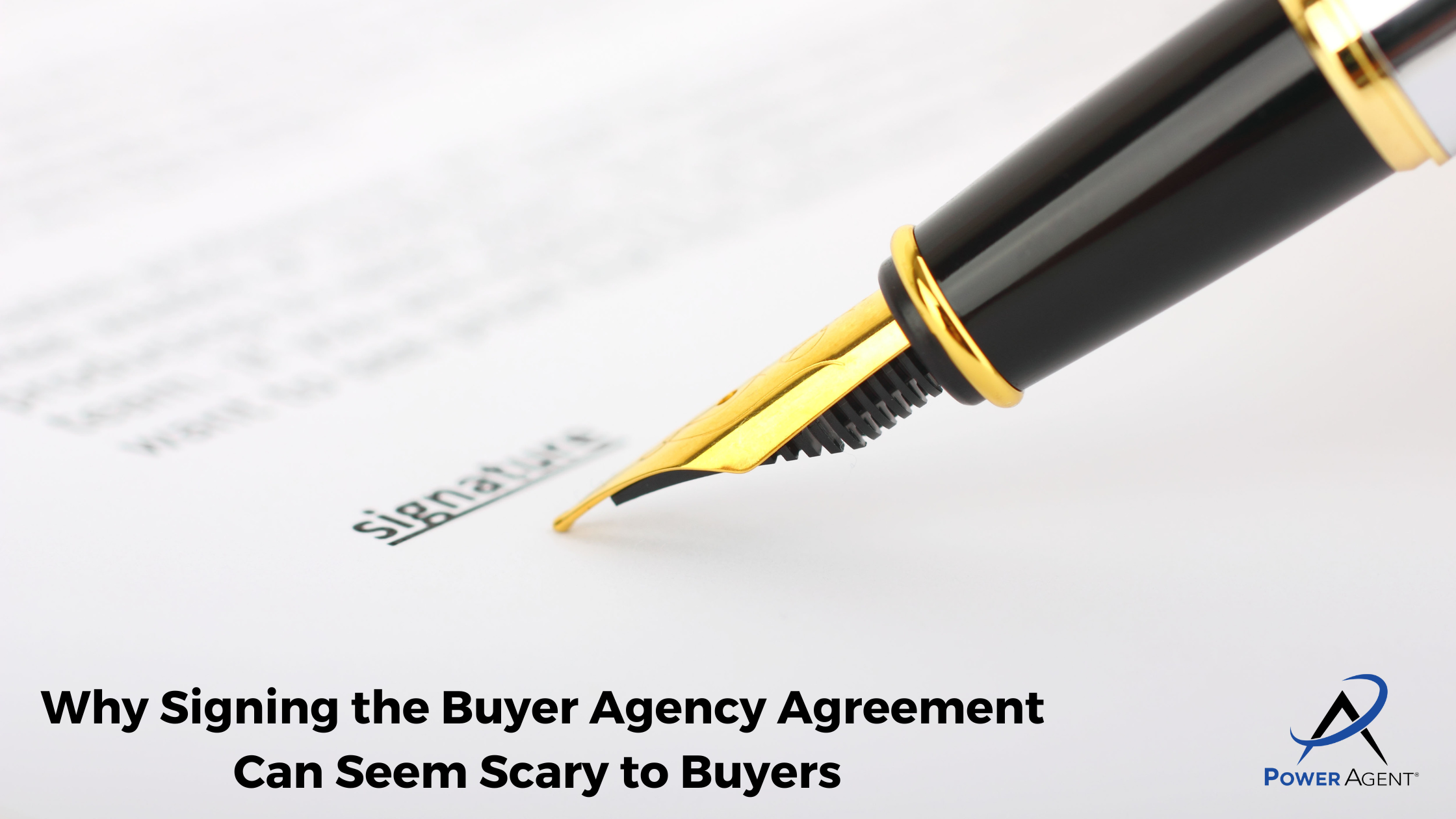
Why Signing the Buyer Agency Agreement Can Seem Scary to Buyers
There’s power in perspective. Here’s why it’s important to understand the buyer mindset when it comes to Buyer Agency.
As agents, we know how important the Buyer Agency agreement is to our business and making sure we get paid. But looking at it from a Buyer’s perspective can help us understand how to better convey its importance.
Real estate agents often get pushback from buyers when it comes to signing the Buyer Agency Agreement, and not always for the reasons you think. Most of the time, it’s because they don’t understand the ramifications of NOT having representation, but sometimes, it’s in the way agents try to communicate these issues that fail to get their value across.
One of our POWER AGENTS® had this problem with one buyer who was referred to her by one of her best clients. This buyer was unwilling to sign the Buyer Agency agreement unless it stated that she wasn’t to be held liable for paying for any part of the commission.
This agent tried explaining the benefits of this agreement, and why that clause was included, but the buyer continued to refuse until it was taken out. This Power Agent® expressed to me that normally, she would drop buyers like that, but because this was a referral from one of her best clients, she wanted to protect that relationship. Now she felt stuck and uncertain how to proceed with this difficult buyer.
How To Convey The Details Without Scaring the Buyers
When it comes to the buyer agency agreement, it’s really important that our clients understand this document, so how we convey the information and the details becomes vital. If you’re asking a buyer to sign an agreement that says “You’re going to be held liable for the commission so I get paid”, that would be unnerving for anyone to sign!
TIP: This article by Stock, Carlson & Asso talks about why the wording is important in contracts.
To make this less worrisome for your buyers, I suggest downplaying the legality of it, though don’t lie. This is what I like to say:
“Here’s what this is, this is what this says — If I’m going to be working to represent you as my client, you are going to make sure I get paid for my work. That’s all it is. Now, 99% of the time, that payment will come out of the contract price and it’s paid that way, so you won’t be paying out of pocket. If you buy a house for $500K, there’s expenses and you’re still paying $500K and part of the expenses is my fee, and it will basically be worked into the mortgage. There is the rare occasion, though it’s never happened to me, where you might have to pay a certain percentage out of pocket, but it hardly ever happens. I promise you, though, that we’re going to do the best that we can to make sure that its not out of pocket for you, but I can’t work for you as my client unless you’re willing to make sure that you’ve got my back.”
If you are struggling with getting buyers to sign this, then really sit down and look at your wording and how you are presenting and conveying this. Then, if they still aren’t agreeing, you can still feel confident that you communicated it as best you could, and if they aren’t willing to watch your back and protect you in the work you do, then that’s not somebody you want as a client, period. Why should you work and be more committed to serving and helping a client who has no commitment to you whatsoever?
There Are Two Possible Results
You may still have resistant buyers, but there comes a point where you need to draw a line in the sand. One of two things will happen — either they hire you as their buyer’s agent, or you are going to refer them to another agent.
Making The Distinction Between A Customer and A Client
In the case of our POWER AGENT®, who was worried about how to maintain the good relationship she had with her current client, I suggested she phone them.
“I really appreciate the referral, and I tried to help them, but the connection just wasn’t there, and I just don’t feel like I can help them, so I referred them to another agent that might work better for them. In real estate, there are two kinds of buyers – customers and clients. Customers are the ones where there isn’t a lot of loyalty, much like customers who shop at grocery stores or shoe stores where they go in, buy something, and leave. Or, if the store doesn’t have it, they go elsewhere. A client, however, is someone you happily do extra work for, like if they came to my car dealership and I didn’t have what they were looking for, so I load them up in my car and drive them to other dealerships until they find the car they want. Unfortunately, they didn’t want to be a client, they wanted to be a customer, so I recommended them to another agent who is a better fit for them.”
Explaining to your buyers how, when they are customers, you have no guarantee that we will get paid for the work you do.
To keep going with the car dealership analogy, a car salesman would get paid no matter what, but the salesman isn’t representing the buyer, they are representing the dealership. In real estate, for the customer to not sign the Buyer Agency agreement means that legally speaking, you have to represent the seller, not the buyer, when it comes time to make an offer and negotiate. Not signing creates a relationship that keeps us from committing to them as buyers. We must look out for the seller’s best interests.
Not only that, but when a new house comes on the market, even if it’s that buyer’s dream home, we will call our clients first to show this new home to them.
Some buyers may respond with “But I talked to two other agents, and they don’t need me to sign this.” You can explain:
“That it’s how they choose to work — they want to treat you like a customer. Why would they do that, you ask? It would mean they need to do extra work. They would have to put your interests ahead of their own. They don’t want to do the research, or to help you with things, or coach you so that you can understand what’s going on in the process. Taking on clients is a lot of extra work, so the truth is, not having an agent asks you to sign this agreement should be almost insulting. I am willing to do this extra work in and put extra time into researching everything, so all I’m asking from you is to make sure that when it comes time, you’ll have my back so I can get paid. That’s all this agreement is. It spells out what you can expect from me, and what I can expect from you. If these other agents aren’t doing that, well, I’m sorry that they aren’t professional or run their business like a business, but I run mine like a business, and I want you to be my client. If you don’t want to sign this, that’s fine. You are welcome to go work with those other agents, because I don’t want to have to treat you like a customer.”
What’s Next?
Are you ready to start taking things to the Next Level®? If you don’t already know what you need to do to get to your next level, we can help!
POWER AGENTS®, for more strategies and tools for handling all the objections and reasons they need to sign the Buyer Agency Agreement, check out the amazing content in the Buyers tab in the Classroom. Whether you need a boost of confidence or brilliant dialogues, we are here to help you get the skills you need to be the go-to agent for the buyers and sellers alike in your farm area.
Get the latest real estate training tips delivered to your inbox!
Not a POWER AGENT® yet? Give us a go! This comprehensive program provides affordable coaching, training, and customizable marketing tools for real estate agents. It’s proven to help thousands of agents significantly boost their listing inventory, solidify their business, cultivate lifelong customers, enhance authenticity and confidence, reduce stress, and craft fulfilling careers and lives.
Start your POWER AGENT® trial and have total access to every tool we have including letters, dialogues, training tips, webinars on-demand, eGuides, and marketing tools.
Contact our team today to sign up or get the answers you need: (800) 395-3905!

